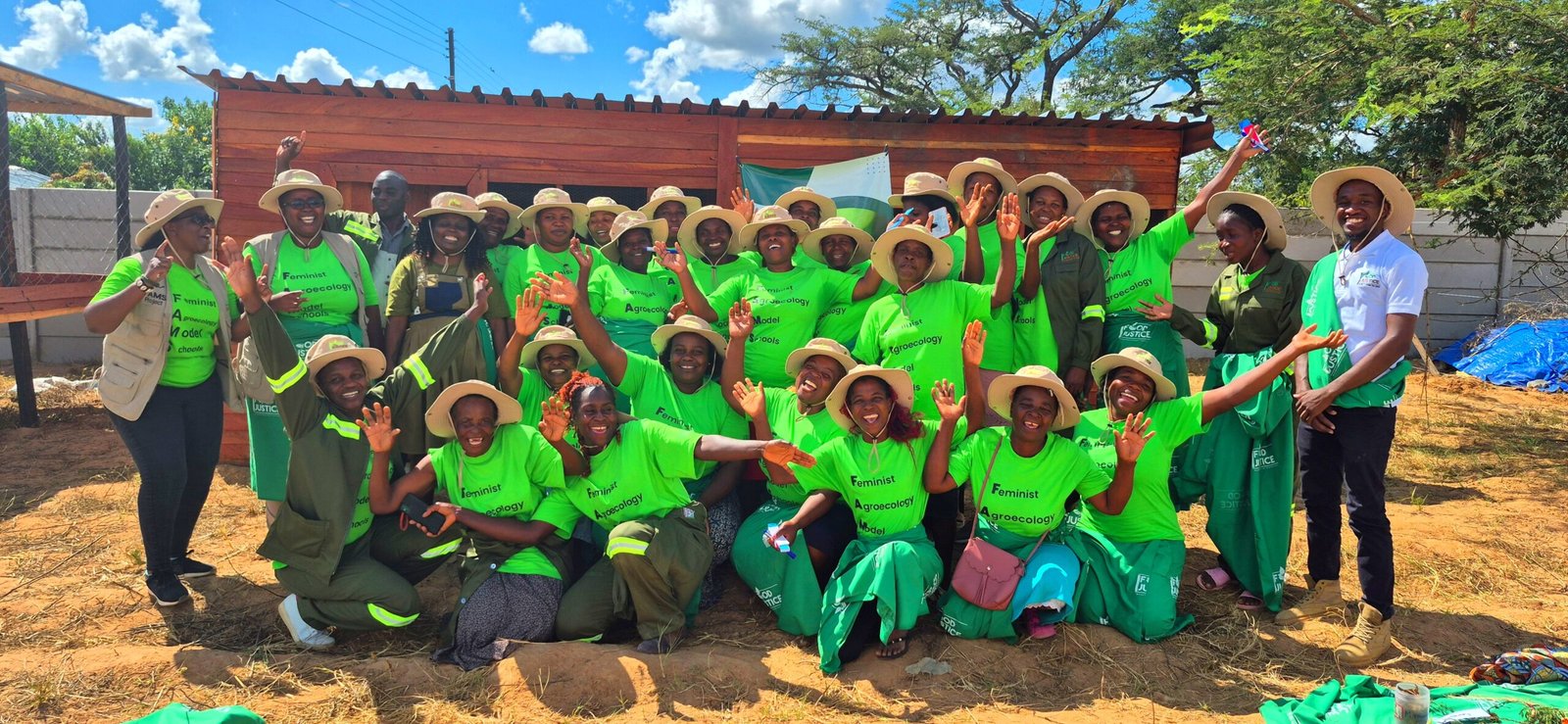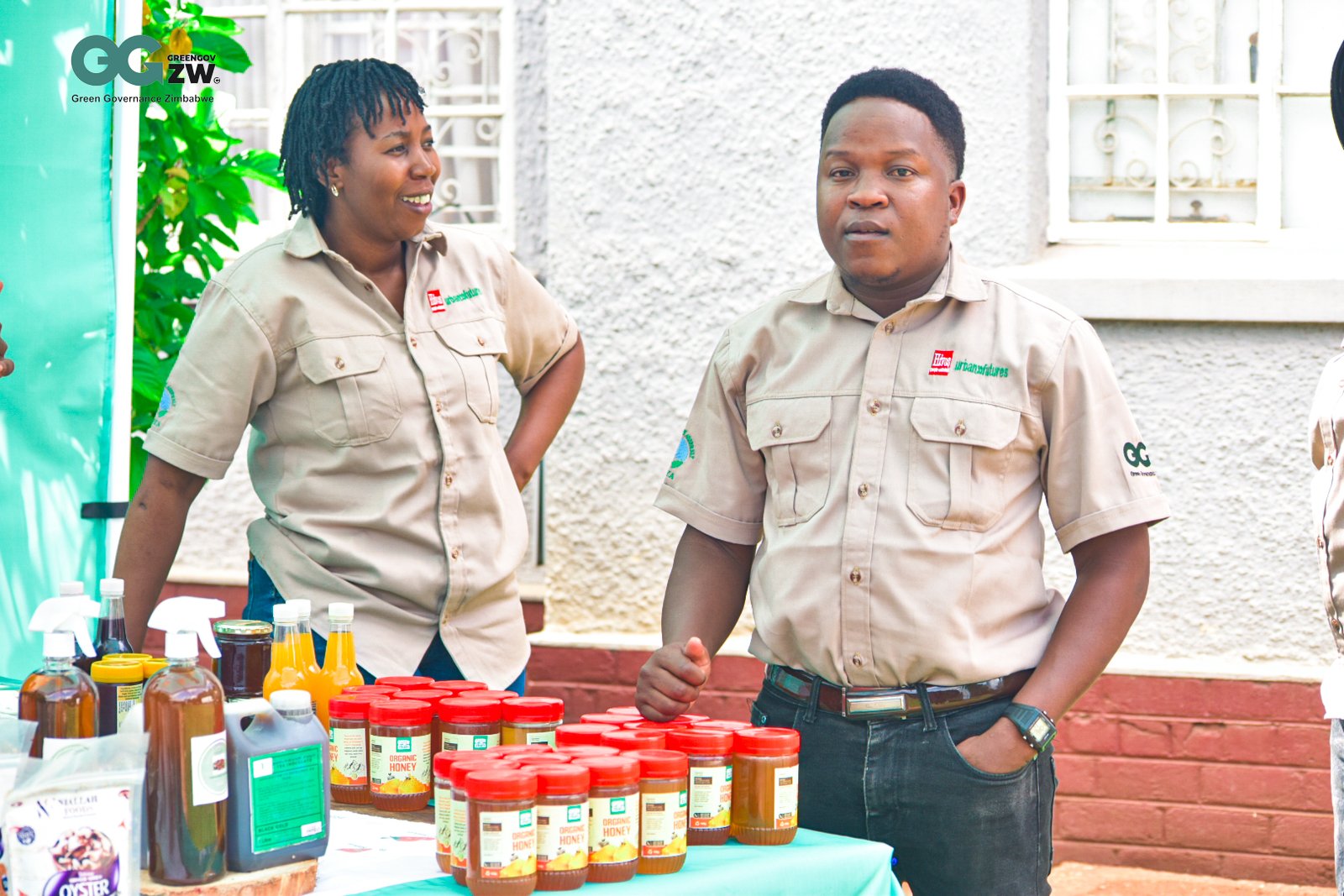With climate change accelerating food crises across southern Africa, Zimbabwe’s Food Justice Network (FJN) is betting on women and agroecology to reverse the trend.
Through its Feminist Agroecology Model Schools (FAMS), the organization has so far trained 25 women to farm sustainably, strengthening climate adaptation strategies while promoting gender equity in rural economies.
Agroecology can be summarised as an approach where nutrients and energy are recycled on the farm in closed loops, rather than relying on external inputs. Crops and livestock are integrated to build balanced local ecosystems, in contrast to monocrop farms, which require extensive use of fertilisers and pesticides.
Project Lead Mr. Rukudzo Kavumbura, said the model school redefines agricultural learning by shifting from conventional farming methods to agroecology, a sustainable approach that harmonizes agriculture with the natural ecosystem.
The goal is to empower communities with knowledge that ensures long-term food security while protecting the planet and fighting climate change.
“This project is being implemented in Dema at Chipochashe Junior School, where we have created a model school that allows people to come and learn about different agricultural enterprises.
“As we know, agriculture has been a common practice among the general populace, but this project approaches agriculture from a different perspective. We are now integrating agroecology, aiming to build a synergy between agriculture and the surrounding ecosystem. This approach helps us to address issues related to food security and the ever-changing climatic conditions,” he said.
The FAMS project is an integrated farming model that connects various agricultural activities in a circular system, where waste from one part becomes a useful input for another.
“This is an integrated agricultural enterprise model whereby we have goats, chickens, mushrooms, rabbits, and a horticultural or nutrition garden, along with a food processing center. We aim to ensure that the inputs and outputs of each enterprise benefit the next, thereby creating a circular economy.”
Mr. Kavumbura also acknowledged that while many people want to grow their own food for self-sufficiency, expensive commercial resources make conventional farming difficult. Shifting to agroecology reduces dependency on commercial inputs by utilizing on-farm and natural resources.
“We have realized that although people want to practice agriculture, they are facing challenges where inputs and other resources are becoming very expensive. At the same time, they want to produce food for themselves and for the livelihoods of their families. Agroecology has principles that allow individuals to utilize the resources they have available, rather than relying on purchases from shops and agro-dealers. This approach empowers them to achieve food sovereignty, enabling them to control the food they eat, what they produce, and the resources they use as inputs to obtain food,” he added.
Ms. Roselilly Ushewokunze, FJN national coordinator, echoed the same sentiments, saying that the agroecology initiative rejects exploitative industrial farming in favor of a holistic, earth-centered approach, where food production heals rather than harms the planet.
“The project aims to address issues related to climate adaptation in agri-food systems and serves as an empowerment initiative for women. We are encouraging them to utilize the resources available in their community. In this space, they will engage in various agroecology activities. As you have seen through our tour, we have small livestock, a garden, a mushroom fruiting chamber, a nursery, and beekeeping to support biodiversity. We want these principles of agroecology to connect and contribute to a holistic change toward sustainable practices.”
The vision is a future where farming sustains both people and ecosystems without compromise.
“We have been facing challenges where the use of agrochemicals and pesticides has been hampering food energy because it negatively impacts the land. Therefore, we want to shift to a healthier, more sustainable agri-food system that is biodiverse and linked to ecological wellness. In this space, we will not use any agrochemicals or pesticides. Our goal is to support biodiversity, food sovereignty, seed sovereignty, and climate justice,” she said.
Women often bear the burden of unpaid care work without financial return, perpetuating inequality. The International Labour Organisation (ILO) estimates that unpaid care work prevents 708 million women from participating in the labour market. Nine out of 10 girls (94%) spend an average of 5 hours and 15 minutes per day on unpaid care work which has harmful long-term consequences, according to a Plan International research.
The FAMS initiative rejects exploitative labor systems by ensuring women’s work is fairly paid.
“We do not want to increase the amount of unpaid care work that these women endure. Through the projects they are involved in, they will be empowered to use whatever produce they harvest and sell it to pay for the labor they contribute.”
“We have made every effort to incorporate the principle of equity into our design, ensuring that they do not labor more than what they will gain in return. We don’t want them to produce where there is no market. The essential idea behind this is that everything works in connection with one another. Everything functions together, there is recycling, and there is no waste. This approach also reduces the amount of unpaid work that women do because there is remuneration from the projects and less need for purchasing. As a result, they have more money at the end of the day,” she added.
The FAMS project goes beyond promoting agroecological farming practices, it also analyzes and challenges policies that obstruct sustainable agriculture in Zimbabwe.
“The project also examines the policies that hinder the transition to agroecology. The FAMS project specifically investigates the status of our climate change bill, exploring ways to enhance it and expedite its passage into law. We also address issues related to disaster risk management, as increased climate impacts lead to more frequent disasters. Our goal is to ensure that our policies are proactive rather than reactive.”
“Currently, Zimbabwe’s Seed Act is under review. This act restricts seed sovereignty by preventing farmers from selling or exchanging their own seeds. Their right to seed is compromised by the Seed Act and the Plant Breeders’ Rights Act. So we want to look into those policies and see how we can actually expedite their amendment or how we can contribute to their change so that they support that transition to agroecology,” she added.
Dr. Linda Mtali, FAMS educator, said that agroecology is not just about ecological farming techniques but also about empowering farmers through socio-economic principles. It promotes seed saving and sharing so that farmers don’t rely on buying expensive seeds every year.
“Under socio-economic principles, we examine the importance of seed sovereignty and food sovereignty. A farmer should know that they have the right to choose what they eat and to control their seeds. We don’t want a situation where farmers are unable to plant during a farming season because they lack the money to buy seeds. This aspect of agroecology trains them to share seeds and to reserve their own.
“It also encourages the use of Open Pollinated Varieties (OPVs), which they can continue using year after year. This practice empowers farmers because those who own their seeds have the power and control over what to plant and when to plant it,” she said.
Sekanawo Jamu, a beneficiary of the FAMS project, underscored the critical role of biodiversity in fostering resilience.
“Biodiversity helps us build resilience. When drought hits, you can sell a goat from your farm to pay your children’s school fees. If you’ve grown small grains, you can harvest and sell them to buy mealie meal for your family,” she said.
Esmary Mudarikwa, a farmer in Seke, said: “This initiative is teaching and exposing us to many new concepts, such as conservation agriculture and water harvesting techniques. With water harvesting, we can retain moisture in the soil during the dry season, which is crucial for sustaining our crops and ensuring food security. These practices not only improve our agricultural productivity but also enhance our resilience to climate variability.”
The programme is one of the efforts to achieve Sustainable Development Goal 2 on ending hunger, achieving food security, improved nutrition and promoting sustainable agriculture.
“With agroecology, I now understand that I have diversity in terms of choices. I will be rearing chickens and goats, along with maintaining a nutritional vegetable garden. This variety allows me to have a range of options for what to eat at any given time, promoting better nutrition for my family and enhancing our overall food security.”
“The ability to choose from different sources of food also empowers us to be more self-sufficient and resilient,” Christine Tungama, FAMS programme beneficiary.
The FAMS project is being hosted by the FJN in collaboration with five other partners in 5 provinces to strengthen movement building towards halting the use of agrochemicals. This was done to spread the project, its principles, and the goals and objectives to various provinces. FJN is working with the Zion City Foundation in Victoria Falls, Young Achievers in Chimanimani, the Matobo Youth Development Initiative in Matabeleland South, Chipochashe Junior School in Dema, and Community Podium in Bulawayo.






The future in Agroecology